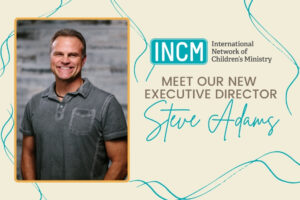 Dr. Michelle Anthony
Dr. Michelle Anthony
The following story is provided by our INCM/CPC Partner David C. Cook. Michelle will also be a keynote speaker and breakout presenter at CPC ’10.
Our children and families live in a hurried world, full of noise and busyness. Many are fighting to simply “make it through another day.” Parents and children alike fall into bed at the end of the day exhausted and completely spent, longing for rest and rejuvenation to simply awake the next morning and do it all over again. Is this the life God called us to? Is there something missing in our modern day missiology? I think it’s time to take a look back to our roots … take a look back to how God designed the rhythm by which His people would live.
In Psalm 145:6-7, David encourages us to remember and celebrate God’s character and His works:
and I will proclaim your great deeds.
They will celebrate your abundant goodness
and joyfully sing of your righteousness.”
This pattern is evident in Scripture from the very beginning. In Genesis, the great Creator God paused on the seventh day to remember His work and celebrate that “it was good.” Passover was established for Israel so they would remember and celebrate God’s great work in delivering His people from the bondage of Egypt. The law regarding the Sabbath acknowledged the need for us to suspend our human efforts and focus on the holiness of God.
From God’s early history with His people, He required celebrations (or feasts) to be part of Israel’s natural rhythm of life. And the New Testament record shows that Jesus and the early church kept these celebrations as well. While we are not bound to keep these feasts, knowledge of them enhances our faith. The feasts’ symbolism is rich and gives testimony to God’s character demonstrated in His work on our behalf.
According to Leviticus 23, the feasts celebrated in the Old Testament include: The Sabbath, Passover and Unleavened Bread, First Fruits, Pentecost, Trumpets, Atonement, and Tabernacles. Each of these feasts has meaning in the Old Testament context, but has even greater meaning in the fulfillment of Christ.
1. The Feast of the Sabbath (Lev. 23:1-3)-A perpetual celebration of worship and rest to mark God’s finished work, first in Creation and then in the redemptive work of Christ on the cross.
2. The Feasts of Passover and Unleavened Bread (Lev. 23:4-8)-A celebration of God’s miraculous deliverance of the Israelites from the Egypt’s bondage and His ultimate deliverance of us from sin’s bondage.
3. The Feast of First Fruits (Lev. 23:9-14)-A remembrance of God’s abundant provision through Christ’s death and resurrection providing us with the opportunity to live an abundant life.
4. The Feast of Weeks/Pentecost (Lev. 23:15-22)-A celebration of God establishing the nation of Israel at Mt. Sinai and the sending of the Holy Spirit to indwell and empower the Church.
5. The Feast of Trumpets (Lev. 23:23-25)-A celebration of God’s faithfulness to His covenant promise and the future calling to Himself of all who believe in Christ.
6. The Day of Atonement (Lev. 23:26-32)-A remembrance of God’s righteousness that demands a sacrifice and the ultimate work of atonement completed in Christ.
7. The Feast of Tabernacles (Lev. 23:33-44)-A celebration of God’s blessing to all who remember their wanderings and now humbly seek to obey Him in Christ.
This biblical model of pausing reveals how the community intentionally stopped and gathered together to remember specific things God had done-both at home and communally. During these times, the community would proclaim how they had seen God at work in their lives and offer joyful worship in celebration.
It’s a challenging thought to consider how to create this environment for today’s children and their families. Outside of a cultural mandate or observance, how do we help this generation take time to be still, to set apart holy space, to simply remember the goodness of God’s character and provision and celebrate in worship? While this challenge may be difficult, it is essential to our faith.
What traditions, rituals, and symbols do today’s children identify as markers of their faith development? What annual observances create an identity for them? Where are the places in our ministry where all the generations come together to celebrate God’s faithfulness? I remember a time when I struggled to answer these questions. These practices were scarce both in my home life and in my ministry. As I began to answer them, I began to catch a glimpse of God’s desire for the community of faith.
In my current children’s ministry, we pause on every 6th and 13th week within the quarter to “Remember and Celebrate.” This weekend is distinct from the others in that we do not cover new material, but take time to reflect on how God has been working in our lives in the weeks prior to our meeting together. We tell stories, we sing, we dance, we play games … and of course, we FEAST! Our children and families are beginning to see this time as a natural rhythm of their lives and can begin to incorporate this value into everyday situations.
Recently, my husband and I celebrated our 21st wedding anniversary. Usually we go out to dinner and exchange gifts or cards. However this time, we decided to introduce this concept of “Remember and Celebrate” into our evening. At dinner, I took out a napkin and began to write down the ways God had showed His faithfulness to us in each year of our lives together. After we completed the list of remembrance, the only response was … celebration and worship! It was the most meaningful anniversary we have ever experienced simply because we took the time to stop, to pause … and remember.
God ordained this kind of rhythm because active remembrance cultivates relationship; God wants us to look back and recognize His faithfulness, intense love, and personal interaction with His people individually and as a community. When we teach children to pause and remember, we teach them what it means to honor our relationship with God-that intimate relationship in which we speak and He listens, He speaks and we respond.
Our children and families are hungry to live out their faith in authentic response to God-and the Biblical rhythm of Remembering and Celebrating offers a vibrant environment for this to happen. No wonder they called these times “feasts”… never have we been more in need of the fullness of God!
Dr. Michelle Anthony earned her B.A. from Biola University in Christian Education and her M.A. in Christian Education with an emphasis in Theology from Talbot Theological Seminary, and her Doctorate in Educational Leadership from Southern Seminary. She has written over a dozen resources in Children’s/Youth ministries and Christian education, and enjoys teaching, speaking, and serving in missions abroad. She has over 20 years of practical church ministry/leadership experience as a Children’s/Family Pastor and is currently serving as the Pastor of Family Ministries at Rock Harbor Church in Costa Mesa, CA. Michelle is a native Californian and has lived in Southern Orange County for the past 20 years along with her husband, Michael, and her two children Chantel and Brendon.





